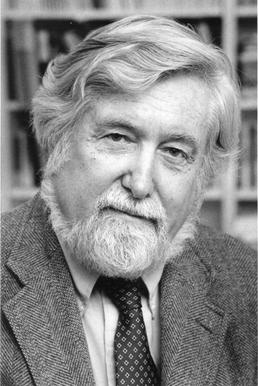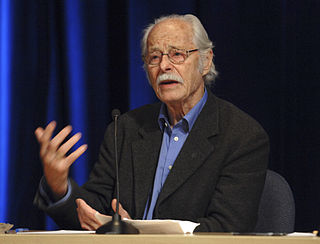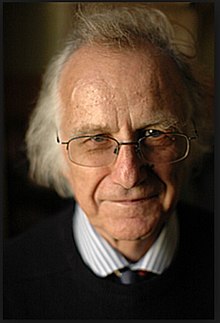
Clifford James Geertz was an American anthropologist who is remembered mostly for his strong support for and influence on the practice of symbolic anthropology and who was considered "for three decades... the single most influential cultural anthropologist in the United States." He served until his death as professor emeritus at the Institute for Advanced Study, Princeton.
Victor Witter Turner was a British cultural anthropologist best known for his work on symbols, rituals, and rites of passage. His work, along with that of Clifford Geertz and others, is often referred to as symbolic and interpretive anthropology.
Herman Max Gluckman was a South African and British social anthropologist. He is best known as the founder of the Manchester School of anthropology.

Thomas Fredrik Weybye Barth was a Norwegian social anthropologist who published several ethnographic books with a clear formalist view. He was a professor in the Department of Anthropology at Boston University, and previously held professorships at the University of Oslo, the University of Bergen, Emory University and Harvard University. He was appointed a government scholar in 1985.
James Clyde Mitchell was a British sociologist and anthropologist.
Berava are a social group or caste amongst the Sinhalese of Sri Lanka. Like the Paraiyar of the neighboring Tamil ethnic group in Sri Lanka as well as Tamil Nadu state in South India they were segregated from the mainstream society yet played and still play an important and vital role in the religious rituals of the mainstream community. In Maharashtra the Berava belongs to maratha(Kshatriya)
Stanley Jeyaraja Tambiah was a social anthropologist and Esther and Sidney Rabb Professor (Emeritus) of Anthropology at Harvard University. He specialised in studies of Thailand, Sri Lanka, and Tamils, as well as the anthropology of religion and politics.
Nur Yalman is a leading Turkish social anthropologist at Harvard University, where he serves as senior Research Professor of Social Anthropology and Middle Eastern Studies.
Psychological anthropology is an interdisciplinary subfield of anthropology that studies the interaction of cultural and mental processes. This subfield tends to focus on ways in which humans' development and enculturation within a particular cultural group—with its own history, language, practices, and conceptual categories—shape processes of human cognition, emotion, perception, motivation, and mental health. It also examines how the understanding of cognition, emotion, motivation, and similar psychological processes inform or constrain our models of cultural and social processes. Each school within psychological anthropology has its own approach.
The Department of Social Anthropology at the University of Manchester, founded by Max Gluckman in 1947 became known among anthropologists and other social scientists as the Manchester School. Notable features of the Manchester School included an emphasis on "case studies", deriving from Gluckman's early training in law and similar to methods used in law schools. The case method involved detailed analysis of particular instances of social interaction to infer rules and assumptions. The Manchester School also read the works of Marx and other economists and sociologists and looked at issues of social justice such as apartheid and class conflict. Recurring themes included issues of conflict and reconciliation in small-scale societies and organizations, and the tension between individual agency and social structure.
Ghassan J. Hage is a Lebanese-Australian academic serving as Future Generation Professor of Anthropology at the University of Melbourne, Australia. He has held a number of visiting professorships including at the American University of Beirut, University of Nanterre – Paris X, the University of Copenhagen and Harvard. He has published several books on immigration, race and refugees in Australia.
Harvey Whitehouse is chair of social anthropology and professorial fellow of Magdalen College at the University of Oxford.
Lester Richard Hiatt, known as Les Hiatt, was a scholar of Australian Aboriginal societies who promoted Australian Aboriginal studies within both the academic world and within the wider public for almost 50 years. He is now regarded as one of Australia's foremost anthropologists.
Jonathan Robert Spencer, is a British social anthropologist and academic. Since 2014, he has been the Regius Professor of South Asian Language, Culture and Society at the University of Edinburgh.
Social anthropology is the study of patterns of behaviour in human societies and cultures. It is the dominant constituent of anthropology throughout the United Kingdom and much of Europe, where it is distinguished from cultural anthropology. In the United States, social anthropology is commonly subsumed within cultural anthropology or sociocultural anthropology.
Jaap van Velsen was a Dutch-born British anthropologist.
Richard P. Werbner is an American anthropologist who specializes in the Zimbabwe and Botswana region, including ritual, personal and historical narrative, politics, law, regional analysis. He has taught at the University of Manchester since 1961.
Norman Long is a British anthropologist. He conducted important fieldwork and made significant theoretical contributions through his application of insights from social anthropology in development studies. Anthropology was in the wake of decolonisation often seen as tainted by colonialism and not relevant in a development discourse. Long offered another perspective that can not be seen as bound by time and place. He advocated an actor-oriented perspective on development and thus formulated a critique on centralist biases in development theory.
Charles Lindholm was the University Professor of Anthropology at Boston University. He was the author of nine books and over seventy articles and reviews. His writings have been translated into Spanish, Turkish, Chinese, Arabic, and Portuguese.
Edith Turner was an English-American anthropologist, poet, and post-secondary educator. In addition to collaborating with her husband, Victor Witter Turner, on a number of early socio-cultural research projects concerning healing, ritual and communitas, she continued to develop these topics following his death in 1983, especially communitas. Edith Turner contributed to the study of humanistic anthropology and was a dedicated social activist her entire life.


